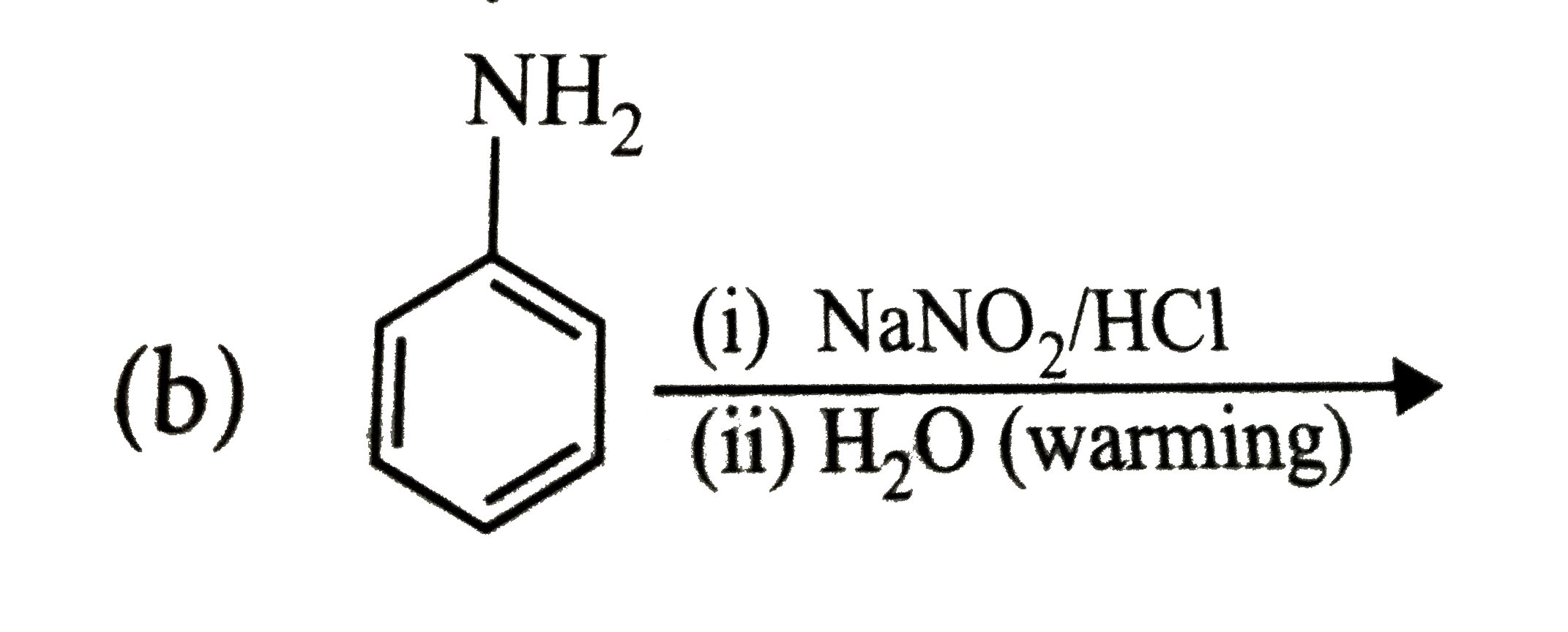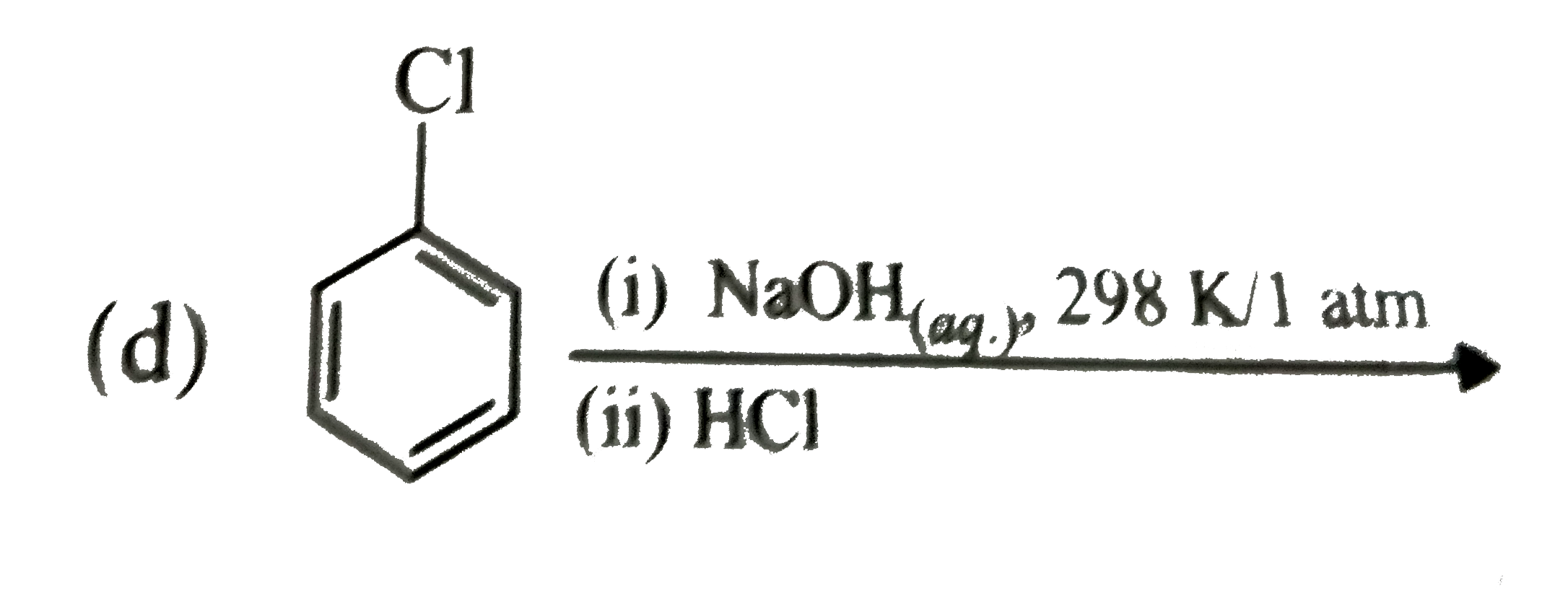In which of the following reaction, the yield of the products does not increase by increase in thepressure?
N2(g)+O2(g)=2NO(g)
2SO2(g)+O2(g)=2SO3(g)
N2(g)+3H2(g)=2NH3(g)
PCl3(g)+Cl2(g)=PCl5(g)
The correct Answer is:A
To determine in which of the following reactions the yield of the products does not increase with an increase in pressure, we can apply Le Chatelier's principle. This principle states that if a system at equilibrium is subjected to a change in pressure, temperature, or concentration, the system will adjust to counteract that change and establish a new equilibrium.
1. Understand the Principle: According to Le Chatelier's principle, increasing the pressure will favor the side of the reaction with fewer moles of gas. Therefore, we need to analyze the number of moles of gas on both sides of the reactions provided.
2. Analyze Each Reaction:
- Reaction 1: N2(g)+O2(g)⇌2NO(g)
- Reactants: 1 mole of N2 + 1 mole of O2 = 2 moles
- Products: 2 moles of NO
- Conclusion: No change in moles (2 moles on both sides). Therefore, increasing pressure does not affect the yield.
- Reaction 2: 2SO2(g)+O2(g)⇌2SO3(g)
- Reactants: 2 moles of SO2 + 1 mole of O2 = 3 moles
- Products: 2 moles of SO3
- Conclusion: Decrease in moles (3 moles to 2 moles). Increasing pressure will favor the formation of SO3.
- Reaction 3: N2(g)+3H2(g)⇌2NH3(g)
- Reactants: 1 mole of N2 + 3 moles of H2 = 4 moles
- Products: 2 moles of NH3
- Conclusion: Decrease in moles (4 moles to 2 moles). Increasing pressure will favor the formation of NH3.
- Reaction 4: PCl3(g)+Cl2(g)⇌PCl5(g)
- Reactants: 1 mole of PCl3 + 1 mole of Cl2 = 2 moles
- Products: 1 mole of PCl5
- Conclusion: Decrease in moles (2 moles to 1 mole). Increasing pressure will favor the formation of PCl5.
3. Final Conclusion: The only reaction where the yield of the product does not increase with an increase in pressure is the first reaction:
N2(g)+O2(g)⇌2NO(g)
Answer:
The yield of the products does not increase by an increase in pressure in the reaction:
N2(g)+O2(g)⇌2NO(g)
- Reaction 1: N2(g)+O2(g)⇌2NO(g)
- Reactants: 1 mole of N2 + 1 mole of O2 = 2 moles
- Products: 2 moles of NO
- Conclusion: No change in moles (2 moles on both sides). Therefore, increasing pressure does not affect the yield.
- Reaction 2: 2SO2(g)+O2(g)⇌2SO3(g)
- Reactants: 2 moles of SO2 + 1 mole of O2 = 3 moles
- Products: 2 moles of SO3
- Conclusion: Decrease in moles (3 moles to 2 moles). Increasing pressure will favor the formation of SO3.
- Reaction 3: N2(g)+3H2(g)⇌2NH3(g)
- Reactants: 1 mole of N2 + 3 moles of H2 = 4 moles
- Products: 2 moles of NH3
- Conclusion: Decrease in moles (4 moles to 2 moles). Increasing pressure will favor the formation of NH3.
- Reaction 4: PCl3(g)+Cl2(g)⇌PCl5(g)
- Reactants: 1 mole of PCl3 + 1 mole of Cl2 = 2 moles
- Products: 1 mole of PCl5
- Conclusion: Decrease in moles (2 moles to 1 mole). Increasing pressure will favor the formation of PCl5.
N2(g)+O2(g)⇌2NO(g)
The yield of the products does not increase by an increase in pressure in the reaction:
N2(g)+O2(g)⇌2NO(g)
Topper's Solved these Questions
- CHEMICAL EQUILIBRIUMBOOK - CENGAGE CHEMISTRY ENGLISHCHAPTER - CHEMICAL EQUILIBRIUMEXERCISE - Exercises (Assertion-Reasoning)
15 Videos
- CHEMICAL EQUILIBRIUMBOOK - CENGAGE CHEMISTRY ENGLISHCHAPTER - CHEMICAL EQUILIBRIUMEXERCISE - Exercises (Integer)
7 Videos
- CHEMICAL EQUILIBRIUMBOOK - CENGAGE CHEMISTRY ENGLISHCHAPTER - CHEMICAL EQUILIBRIUMEXERCISE - Exercises (Multiple Correct)
26 Videos
- CHEMICAL BONDING AND MOLECULAR STRUCTUREBOOK - CENGAGE CHEMISTRY ENGLISHCHAPTER - CHEMICAL BONDING AND MOLECULAR STRUCTUREEXERCISE - Archives Subjective
15 Videos
- CLASSIFICATION AND NOMENCLATURE OF ORGANIC COMPOUNDSBOOK - CENGAGE CHEMISTRY ENGLISHCHAPTER - CLASSIFICATION AND NOMENCLATURE OF ORGANIC COMPOUNDSEXERCISE - Analytical and Descriptive Type
3 Videos
Similar Questions
Knowledge Check
Which of the following reactions will not yield phenol ?
A B
B C
C D
D
Which of the following reactions does not show the correct products of the reaction?
ACH3−CH=CH2HBr−−−−→peroxideCH3−CH2−CH2BrBCH3−CH=CH2HCl−−−−→peroxideCH3−CH2−CH2ClCCH3−CH=CH2HBr−−→CH3−Br∣CH−CH3DCH3−CH=CH2HCl−−→CH3−C∣ClH−CH3
Which of the following reactions will yield phenol ?
View SolutionIn which of the following reaction, the formation of product is favoured by increase in pressure?
View SolutionWhich of the following reactions give the poor yield of amine products?
View SolutionReaction in which yield of product will increase with increase in pressure is
View SolutionWhich of the following reactions does not yield an amine?
View SolutionIn which of the following reaction product does not contian 'peroxoy' linakge?
View Solution
